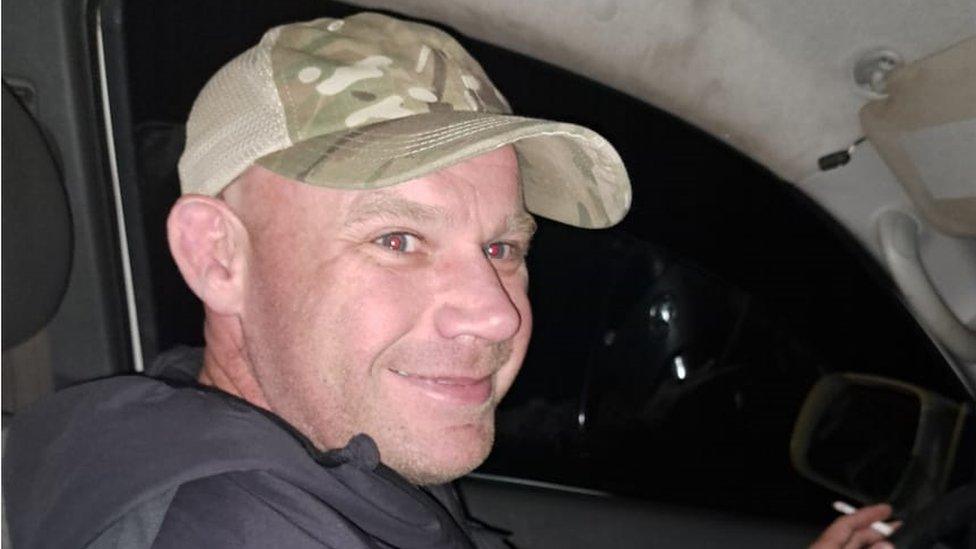Kherson: Russia to withdraw troops from key Ukrainian city
- Published
- comments
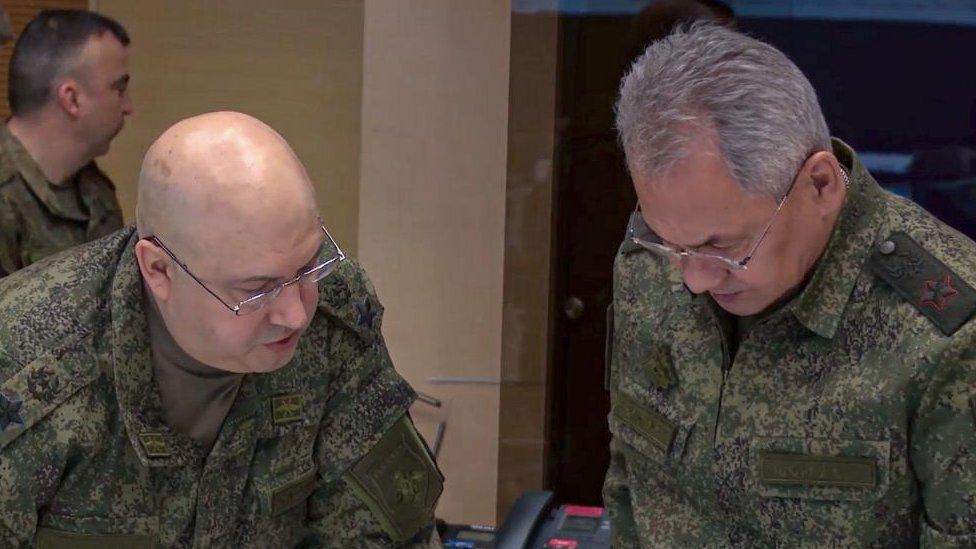
Gen Surovikin (L) said the withdrawal, ordered by the defence minister (R) was a difficult decision
Russia's military has been ordered to pull out of the Ukrainian city of Kherson, the only regional capital it captured after invading in February.
Russia's commander in Ukraine, Gen Sergei Surovikin, said it was no longer possible to keep supplying the city.
The withdrawal means Russian forces will pull out entirely from the western bank of the River Dnipro.
It is a significant blow as Russia faces a Ukrainian counter-offensive.
The military's top brass announced the decision on Russian state TV, with Gen Surovikin reporting on the situation on the ground in Kherson.
President Vladimir Putin did not take part in the staged event. The architect of Russia's failing war in Ukraine appeared to have left the announcement to his generals.
It was Mr Putin who announced Russia's annexation of Kherson, and three other occupied regions, at the end of September.
"In these circumstances, the most sensible option is to organise the defence along a barrier line along the river Dnipro," Gen Surovikin told the meeting.
But its decision to pull back across the Dnipro river was treated with caution by Ukrainian officials.
In his nightly address on Wednesday, President Volodymyr Zelensky said Kyiv was moving "very carefully" after the announcement.
"The enemy does not give us gifts, does not make 'goodwill gestures', we win it all," he said.
"Therefore, we are moving very carefully, without emotions, without unnecessary risk, in the interests of liberating all our land and so that the losses are as small as possible."
Earlier, his adviser Mykhailo Podolyak said "actions speak louder than words".
All week, reports and rumours that Russia would leave Kherson have circulated. At a Ukrainian position on the perimeter around Kherson, soldiers said the enemy might be trying to draw them into a trap.
The Ukrainian commander said they had good intelligence, and would only advance cautiously.
After Russia's announcement, civilians inside Kherson said Chechen troops from the Russian military are in the city, in cafes, and moving around the streets.
Another civilian said: "Visually, nothing has changed. On the right bank [western bank] in Kherson, they are almost invisible, and it has been [like that] for several days. They have already taken everything they could.
"There are a lot of them on the left bank, and they are building fortifications along the Dnipro and Plavni."
Another Kherson resident, Olga, told the BBC there were fewer soldiers in the city.
"I've been suffering this occupation but I stayed in Kherson because I thought that it's unfair to leave Kherson," she said. "I had to stay here and overcome all these difficulties, I thought that it was my ordeal. I don't know, I had to stay. And I'm happy that it's coming to an end."
Allies of President Putin - both who have been critical of Russia's war effort - welcomed the withdrawal.
Yevgeny Prigozhin, founder of the Wagner mercenary group and a long-time Putin associate, said that while the decision is "not a victorious step" it was important "not to agonise, not to get paranoidal, but to draw conclusions and work on mistakes".
"The decision taken by [Gen] Surovikin is not easy, but he acted like a man who is not afraid of responsibility. He did it in an organised manner, without fear, taking upon himself the full weight of the decision-making," Mr Prigozhin said.
Chechen leader Ramzan Kadyrov - who Putin picked to rule the autonomous republic in the North Caucasus region in 2007 - said Gen Surovikin had acted "like a real military general, not afraid of criticism".
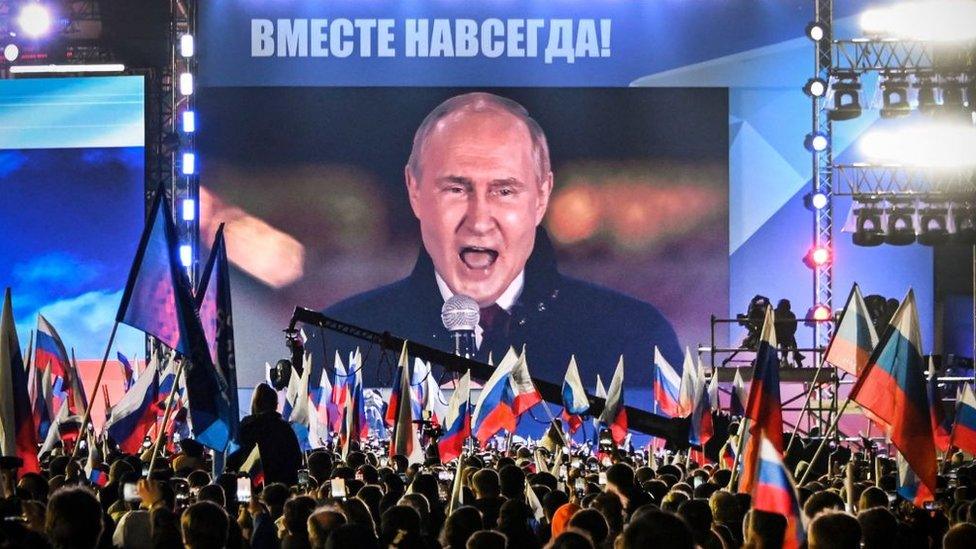
Vladimir Putin celebrated his annexation of occupied regions but his forces were already on the back foot in Kherson
The move was also welcomed by many in Ukraine, particularly on social media, with some finding humour in the withdrawal.
"Finally, a gesture of goodwill," economist and blogger Serhiy Fursa said on Facebook, recalling Russia's explanation for previous military defeats.
Nato secretary general Jens Stoltenberg said it was "encouraging" to see Ukraine making advances.
"The gains...belong to the brave, courageous Ukrainian soldiers, but of course the support they receive from the United Kingdom, from Nato allies and partners is also essential," he said.
Russian troops swept across southern Ukraine from annexed Crimea at the start of the war, seizing Kherson city in early March.
They also launched attacks in the south, east and north of the country, including surrounding the capital, Kyiv. In recent months, however, Ukraine's forces have made significant advances.
This counter-offensive escalated in September, when Ukraine drove back Russian forces, retaking the cities of Izyum and Kupiansk, both key supply hubs for Moscow's forces. Since then, Russia has mainly focused its military operations in smaller pockets of Ukraine's south, east and north-east.
There is no way for Moscow to depict this withdrawal as anything other than a humiliating setback - its biggest loss since Ukraine recaptured large areas around the city of Kharkiv in the early autumn.
And it further undermines Russia's announcement that it was illegally annexing Ukrainian provinces, including Kherson, which it said would remain Russian territory "forever".
But, as Mr Podolyak warned, there are several reasons for Ukraine to be cautious.
The first is that retreating Russian forces will most likely have left behind mines and booby traps for the advancing Ukrainians.
The second is that Russia, having withdrawn its troops to the east bank - and having "evacuated", sometimes by force, large numbers of civilians - will now be tempted to bombard Kherson at will.
Finally, the pattern emerging in this war is that every time Russia suffers a major military setback it responds by further punishing the civilian population.
Expect more missile and drone strikes to make winter for Ukrainians as miserable as possible.
Watch: Ros Atkins asks Jeremy Bowen about reporting from Ukraine's frontline
The withdrawal was announced shortly after Russian media said the deputy leader of Kherson, Kirill Stremousov, had been killed in a car crash.
Seen as one of the main cheerleaders of the occupation of Kherson, he had warned only six days ago that it was "most likely" that Russian forces would have to cross to the eastern bank.
Although the Ukrainian advance had slowed in recent weeks, Russia's supply lines across the Dnipro had become increasingly difficult after the few bridges across were destroyed by Ukrainian missiles.
Before the withdrawal, Russia moved thousands of civilians out of the city by boat, in what Ukraine condemned as a forced deportation.
Gen Surovikin - previously a notorious commander of Russia's recent operations in Syria - was appointed to take over the running of Russia's invasion a month ago.
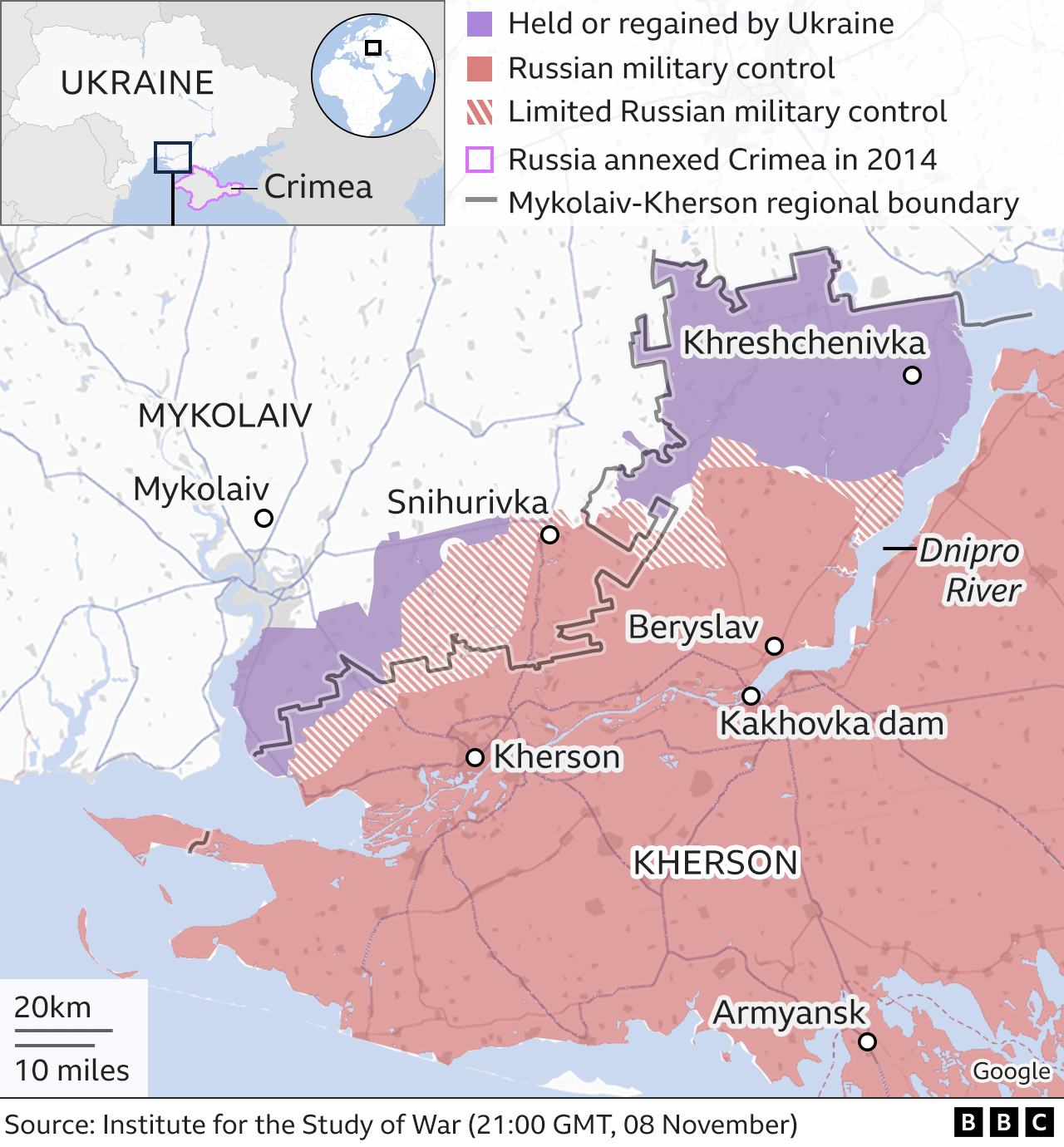
Related topics
- Published8 November 2022
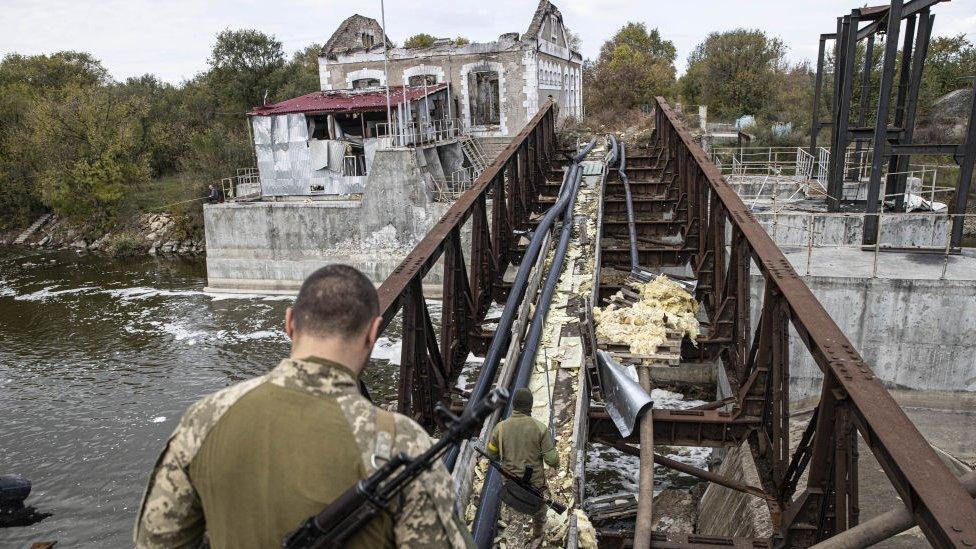
- Published12 October 2022
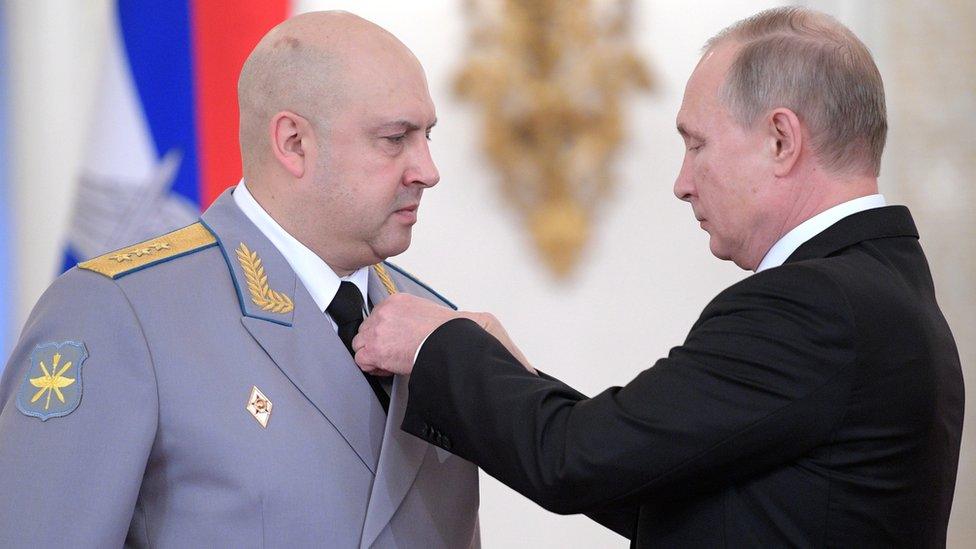
- Published9 November 2022
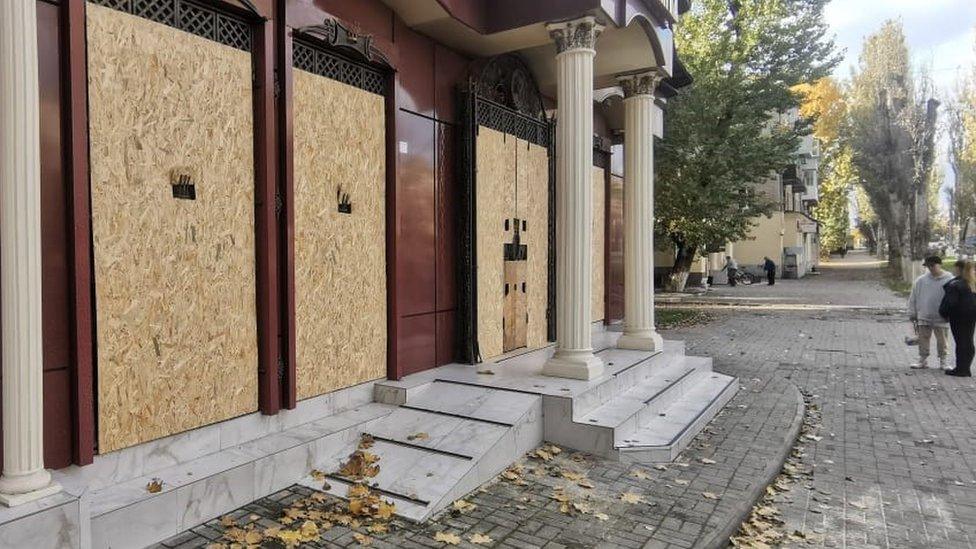
- Published9 November 2022
